Leadership Reflective Report: Beginning Practice, System04104, 2019
VerifiedAdded on 2022/12/05
|9
|3400
|152
Report
AI Summary
This reflective report, submitted by a nursing student, analyzes a case study involving poor leadership behavior within a healthcare setting, specifically focusing on the interactions between a registrar, a Nursing Unit Manager (NUM), and a nurse named Kim during an intubation procedure. The report utilizes the Gibbs Reflective Cycle to examine the events, feelings, and analyses of the situation, highlighting the importance of patience, effective communication, and ethical conduct in nursing leadership. The student reflects on their own leadership style, identified as ESFJ-A, and discusses strengths and weaknesses related to this personality type. The report emphasizes the significance of maintaining a positive work environment, respecting the dignity of colleagues, and providing support and training to foster professional development and prevent future misunderstandings. The student proposes an action plan that prioritizes communication skills training, promotion of respect, and the development of confidence among staff members to improve overall healthcare service delivery.
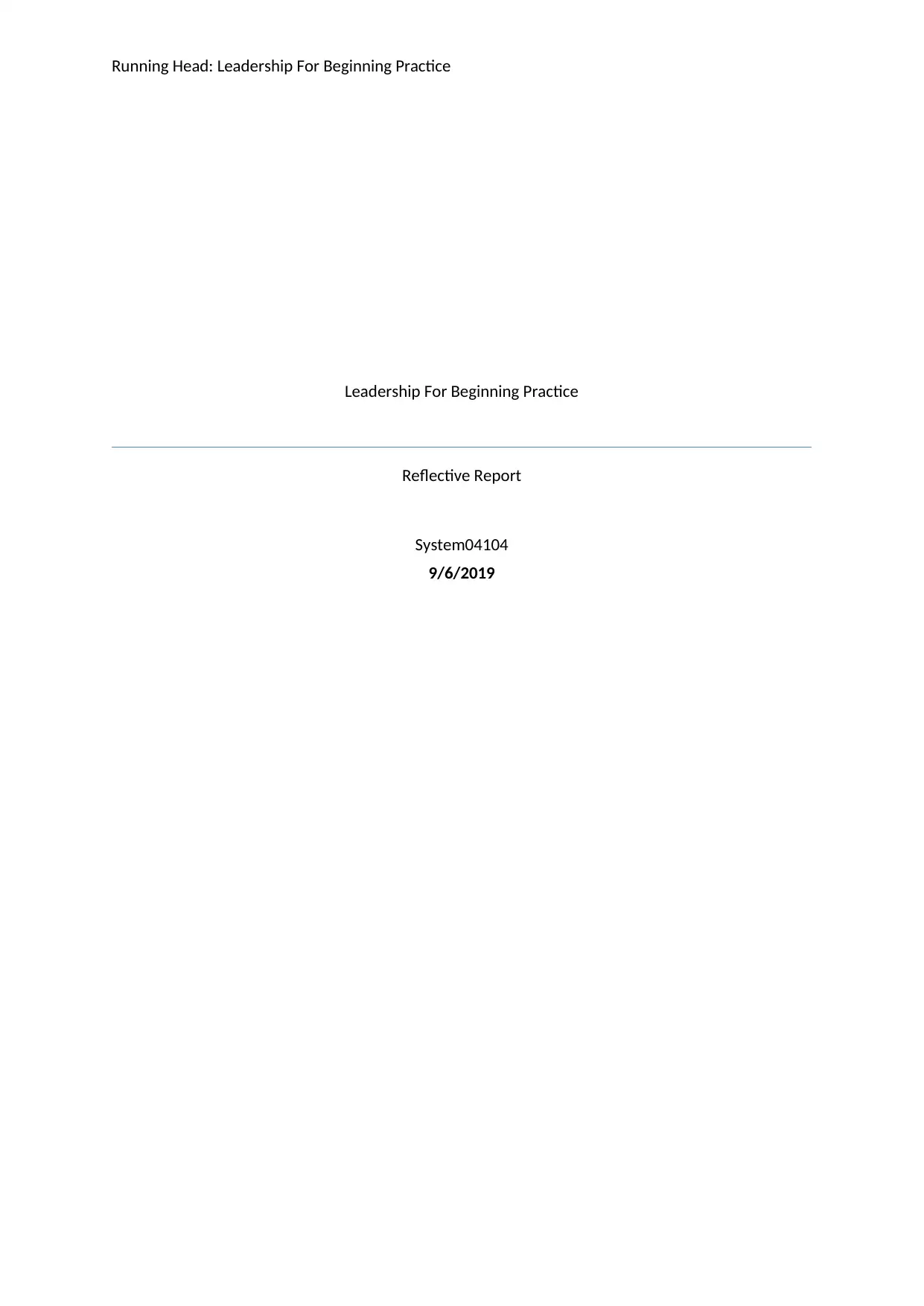
Running Head: Leadership For Beginning Practice
Leadership For Beginning Practice
Reflective Report
System04104
9/6/2019
Leadership For Beginning Practice
Reflective Report
System04104
9/6/2019
Paraphrase This Document
Need a fresh take? Get an instant paraphrase of this document with our AI Paraphraser
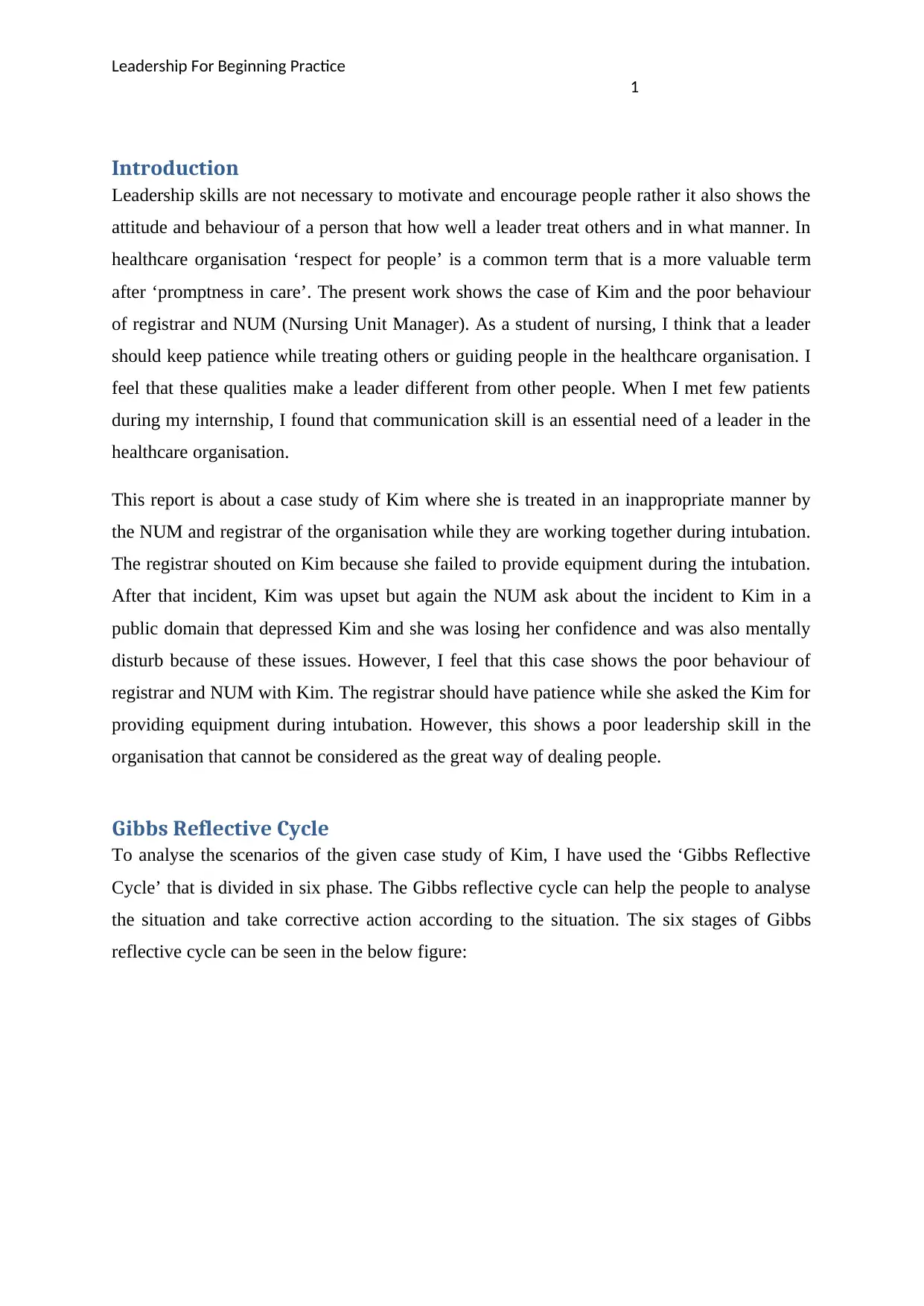
Leadership For Beginning Practice
1
Introduction
Leadership skills are not necessary to motivate and encourage people rather it also shows the
attitude and behaviour of a person that how well a leader treat others and in what manner. In
healthcare organisation ‘respect for people’ is a common term that is a more valuable term
after ‘promptness in care’. The present work shows the case of Kim and the poor behaviour
of registrar and NUM (Nursing Unit Manager). As a student of nursing, I think that a leader
should keep patience while treating others or guiding people in the healthcare organisation. I
feel that these qualities make a leader different from other people. When I met few patients
during my internship, I found that communication skill is an essential need of a leader in the
healthcare organisation.
This report is about a case study of Kim where she is treated in an inappropriate manner by
the NUM and registrar of the organisation while they are working together during intubation.
The registrar shouted on Kim because she failed to provide equipment during the intubation.
After that incident, Kim was upset but again the NUM ask about the incident to Kim in a
public domain that depressed Kim and she was losing her confidence and was also mentally
disturb because of these issues. However, I feel that this case shows the poor behaviour of
registrar and NUM with Kim. The registrar should have patience while she asked the Kim for
providing equipment during intubation. However, this shows a poor leadership skill in the
organisation that cannot be considered as the great way of dealing people.
Gibbs Reflective Cycle
To analyse the scenarios of the given case study of Kim, I have used the ‘Gibbs Reflective
Cycle’ that is divided in six phase. The Gibbs reflective cycle can help the people to analyse
the situation and take corrective action according to the situation. The six stages of Gibbs
reflective cycle can be seen in the below figure:
1
Introduction
Leadership skills are not necessary to motivate and encourage people rather it also shows the
attitude and behaviour of a person that how well a leader treat others and in what manner. In
healthcare organisation ‘respect for people’ is a common term that is a more valuable term
after ‘promptness in care’. The present work shows the case of Kim and the poor behaviour
of registrar and NUM (Nursing Unit Manager). As a student of nursing, I think that a leader
should keep patience while treating others or guiding people in the healthcare organisation. I
feel that these qualities make a leader different from other people. When I met few patients
during my internship, I found that communication skill is an essential need of a leader in the
healthcare organisation.
This report is about a case study of Kim where she is treated in an inappropriate manner by
the NUM and registrar of the organisation while they are working together during intubation.
The registrar shouted on Kim because she failed to provide equipment during the intubation.
After that incident, Kim was upset but again the NUM ask about the incident to Kim in a
public domain that depressed Kim and she was losing her confidence and was also mentally
disturb because of these issues. However, I feel that this case shows the poor behaviour of
registrar and NUM with Kim. The registrar should have patience while she asked the Kim for
providing equipment during intubation. However, this shows a poor leadership skill in the
organisation that cannot be considered as the great way of dealing people.
Gibbs Reflective Cycle
To analyse the scenarios of the given case study of Kim, I have used the ‘Gibbs Reflective
Cycle’ that is divided in six phase. The Gibbs reflective cycle can help the people to analyse
the situation and take corrective action according to the situation. The six stages of Gibbs
reflective cycle can be seen in the below figure:
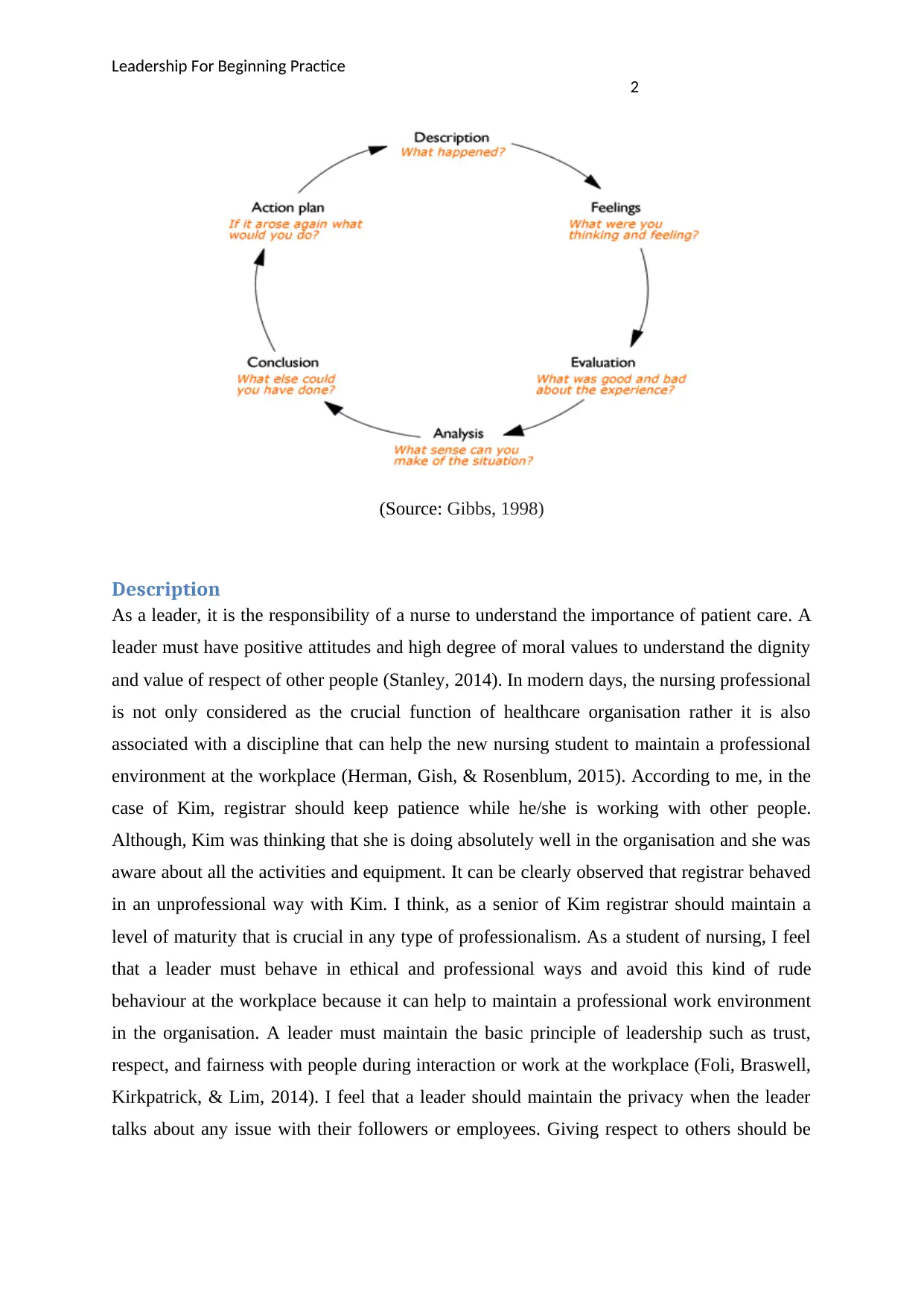
Leadership For Beginning Practice
2
(Source: Gibbs, 1998)
Description
As a leader, it is the responsibility of a nurse to understand the importance of patient care. A
leader must have positive attitudes and high degree of moral values to understand the dignity
and value of respect of other people (Stanley, 2014). In modern days, the nursing professional
is not only considered as the crucial function of healthcare organisation rather it is also
associated with a discipline that can help the new nursing student to maintain a professional
environment at the workplace (Herman, Gish, & Rosenblum, 2015). According to me, in the
case of Kim, registrar should keep patience while he/she is working with other people.
Although, Kim was thinking that she is doing absolutely well in the organisation and she was
aware about all the activities and equipment. It can be clearly observed that registrar behaved
in an unprofessional way with Kim. I think, as a senior of Kim registrar should maintain a
level of maturity that is crucial in any type of professionalism. As a student of nursing, I feel
that a leader must behave in ethical and professional ways and avoid this kind of rude
behaviour at the workplace because it can help to maintain a professional work environment
in the organisation. A leader must maintain the basic principle of leadership such as trust,
respect, and fairness with people during interaction or work at the workplace (Foli, Braswell,
Kirkpatrick, & Lim, 2014). I feel that a leader should maintain the privacy when the leader
talks about any issue with their followers or employees. Giving respect to others should be
2
(Source: Gibbs, 1998)
Description
As a leader, it is the responsibility of a nurse to understand the importance of patient care. A
leader must have positive attitudes and high degree of moral values to understand the dignity
and value of respect of other people (Stanley, 2014). In modern days, the nursing professional
is not only considered as the crucial function of healthcare organisation rather it is also
associated with a discipline that can help the new nursing student to maintain a professional
environment at the workplace (Herman, Gish, & Rosenblum, 2015). According to me, in the
case of Kim, registrar should keep patience while he/she is working with other people.
Although, Kim was thinking that she is doing absolutely well in the organisation and she was
aware about all the activities and equipment. It can be clearly observed that registrar behaved
in an unprofessional way with Kim. I think, as a senior of Kim registrar should maintain a
level of maturity that is crucial in any type of professionalism. As a student of nursing, I feel
that a leader must behave in ethical and professional ways and avoid this kind of rude
behaviour at the workplace because it can help to maintain a professional work environment
in the organisation. A leader must maintain the basic principle of leadership such as trust,
respect, and fairness with people during interaction or work at the workplace (Foli, Braswell,
Kirkpatrick, & Lim, 2014). I feel that a leader should maintain the privacy when the leader
talks about any issue with their followers or employees. Giving respect to others should be
⊘ This is a preview!⊘
Do you want full access?
Subscribe today to unlock all pages.

Trusted by 1+ million students worldwide
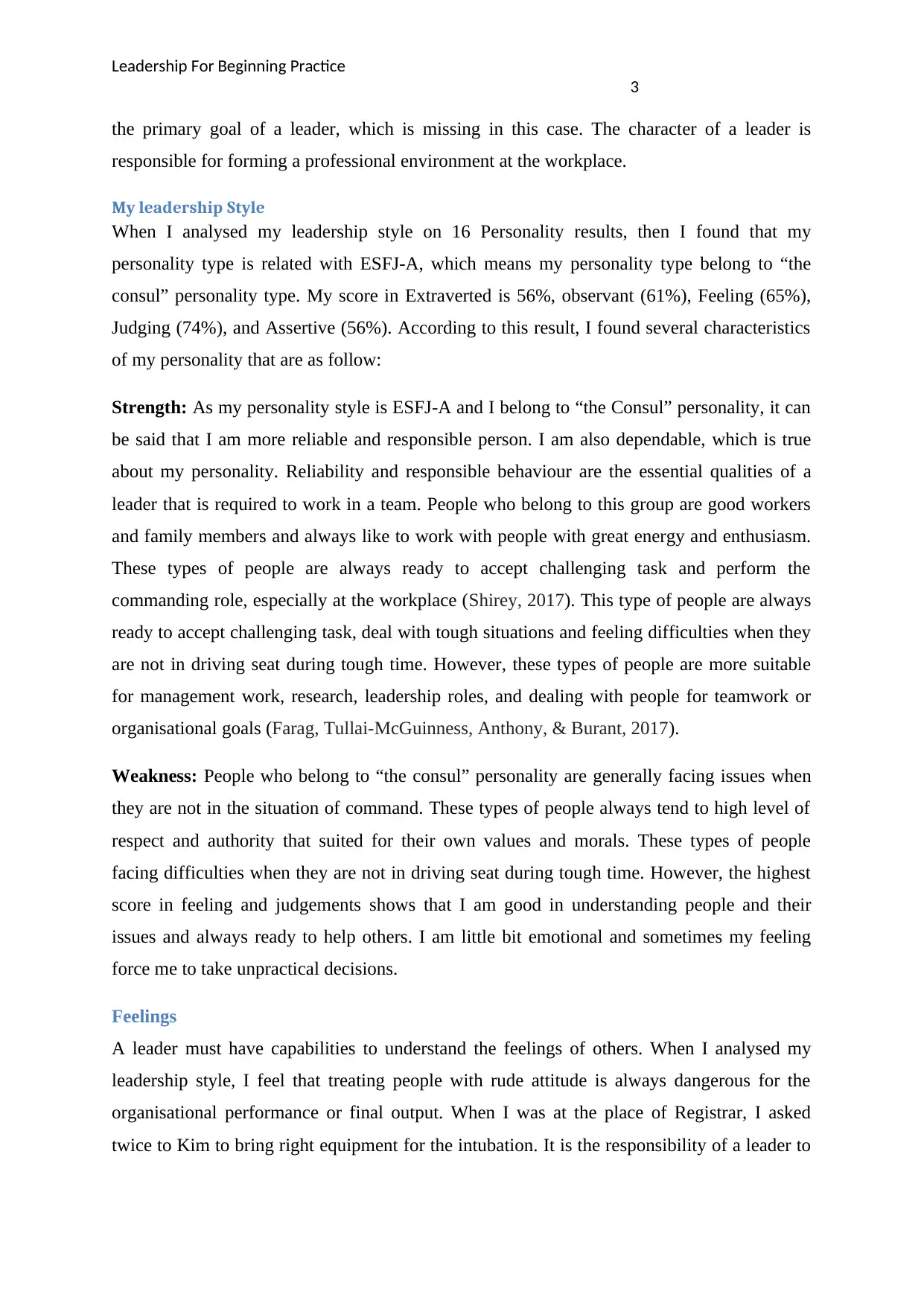
Leadership For Beginning Practice
3
the primary goal of a leader, which is missing in this case. The character of a leader is
responsible for forming a professional environment at the workplace.
My leadership Style
When I analysed my leadership style on 16 Personality results, then I found that my
personality type is related with ESFJ-A, which means my personality type belong to “the
consul” personality type. My score in Extraverted is 56%, observant (61%), Feeling (65%),
Judging (74%), and Assertive (56%). According to this result, I found several characteristics
of my personality that are as follow:
Strength: As my personality style is ESFJ-A and I belong to “the Consul” personality, it can
be said that I am more reliable and responsible person. I am also dependable, which is true
about my personality. Reliability and responsible behaviour are the essential qualities of a
leader that is required to work in a team. People who belong to this group are good workers
and family members and always like to work with people with great energy and enthusiasm.
These types of people are always ready to accept challenging task and perform the
commanding role, especially at the workplace (Shirey, 2017). This type of people are always
ready to accept challenging task, deal with tough situations and feeling difficulties when they
are not in driving seat during tough time. However, these types of people are more suitable
for management work, research, leadership roles, and dealing with people for teamwork or
organisational goals (Farag, Tullai-McGuinness, Anthony, & Burant, 2017).
Weakness: People who belong to “the consul” personality are generally facing issues when
they are not in the situation of command. These types of people always tend to high level of
respect and authority that suited for their own values and morals. These types of people
facing difficulties when they are not in driving seat during tough time. However, the highest
score in feeling and judgements shows that I am good in understanding people and their
issues and always ready to help others. I am little bit emotional and sometimes my feeling
force me to take unpractical decisions.
Feelings
A leader must have capabilities to understand the feelings of others. When I analysed my
leadership style, I feel that treating people with rude attitude is always dangerous for the
organisational performance or final output. When I was at the place of Registrar, I asked
twice to Kim to bring right equipment for the intubation. It is the responsibility of a leader to
3
the primary goal of a leader, which is missing in this case. The character of a leader is
responsible for forming a professional environment at the workplace.
My leadership Style
When I analysed my leadership style on 16 Personality results, then I found that my
personality type is related with ESFJ-A, which means my personality type belong to “the
consul” personality type. My score in Extraverted is 56%, observant (61%), Feeling (65%),
Judging (74%), and Assertive (56%). According to this result, I found several characteristics
of my personality that are as follow:
Strength: As my personality style is ESFJ-A and I belong to “the Consul” personality, it can
be said that I am more reliable and responsible person. I am also dependable, which is true
about my personality. Reliability and responsible behaviour are the essential qualities of a
leader that is required to work in a team. People who belong to this group are good workers
and family members and always like to work with people with great energy and enthusiasm.
These types of people are always ready to accept challenging task and perform the
commanding role, especially at the workplace (Shirey, 2017). This type of people are always
ready to accept challenging task, deal with tough situations and feeling difficulties when they
are not in driving seat during tough time. However, these types of people are more suitable
for management work, research, leadership roles, and dealing with people for teamwork or
organisational goals (Farag, Tullai-McGuinness, Anthony, & Burant, 2017).
Weakness: People who belong to “the consul” personality are generally facing issues when
they are not in the situation of command. These types of people always tend to high level of
respect and authority that suited for their own values and morals. These types of people
facing difficulties when they are not in driving seat during tough time. However, the highest
score in feeling and judgements shows that I am good in understanding people and their
issues and always ready to help others. I am little bit emotional and sometimes my feeling
force me to take unpractical decisions.
Feelings
A leader must have capabilities to understand the feelings of others. When I analysed my
leadership style, I feel that treating people with rude attitude is always dangerous for the
organisational performance or final output. When I was at the place of Registrar, I asked
twice to Kim to bring right equipment for the intubation. It is the responsibility of a leader to
Paraphrase This Document
Need a fresh take? Get an instant paraphrase of this document with our AI Paraphraser
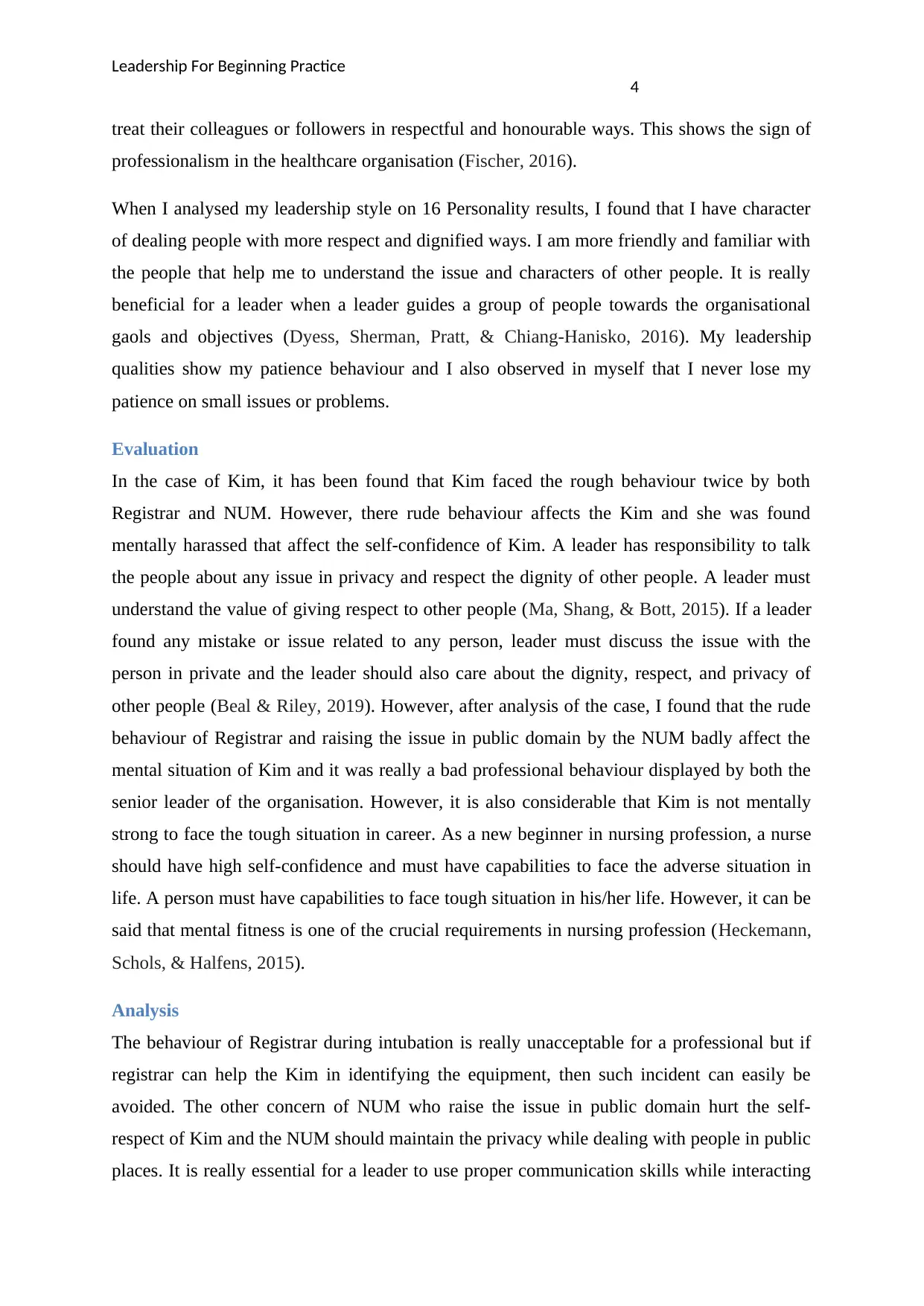
Leadership For Beginning Practice
4
treat their colleagues or followers in respectful and honourable ways. This shows the sign of
professionalism in the healthcare organisation (Fischer, 2016).
When I analysed my leadership style on 16 Personality results, I found that I have character
of dealing people with more respect and dignified ways. I am more friendly and familiar with
the people that help me to understand the issue and characters of other people. It is really
beneficial for a leader when a leader guides a group of people towards the organisational
gaols and objectives (Dyess, Sherman, Pratt, & Chiang-Hanisko, 2016). My leadership
qualities show my patience behaviour and I also observed in myself that I never lose my
patience on small issues or problems.
Evaluation
In the case of Kim, it has been found that Kim faced the rough behaviour twice by both
Registrar and NUM. However, there rude behaviour affects the Kim and she was found
mentally harassed that affect the self-confidence of Kim. A leader has responsibility to talk
the people about any issue in privacy and respect the dignity of other people. A leader must
understand the value of giving respect to other people (Ma, Shang, & Bott, 2015). If a leader
found any mistake or issue related to any person, leader must discuss the issue with the
person in private and the leader should also care about the dignity, respect, and privacy of
other people (Beal & Riley, 2019). However, after analysis of the case, I found that the rude
behaviour of Registrar and raising the issue in public domain by the NUM badly affect the
mental situation of Kim and it was really a bad professional behaviour displayed by both the
senior leader of the organisation. However, it is also considerable that Kim is not mentally
strong to face the tough situation in career. As a new beginner in nursing profession, a nurse
should have high self-confidence and must have capabilities to face the adverse situation in
life. A person must have capabilities to face tough situation in his/her life. However, it can be
said that mental fitness is one of the crucial requirements in nursing profession (Heckemann,
Schols, & Halfens, 2015).
Analysis
The behaviour of Registrar during intubation is really unacceptable for a professional but if
registrar can help the Kim in identifying the equipment, then such incident can easily be
avoided. The other concern of NUM who raise the issue in public domain hurt the self-
respect of Kim and the NUM should maintain the privacy while dealing with people in public
places. It is really essential for a leader to use proper communication skills while interacting
4
treat their colleagues or followers in respectful and honourable ways. This shows the sign of
professionalism in the healthcare organisation (Fischer, 2016).
When I analysed my leadership style on 16 Personality results, I found that I have character
of dealing people with more respect and dignified ways. I am more friendly and familiar with
the people that help me to understand the issue and characters of other people. It is really
beneficial for a leader when a leader guides a group of people towards the organisational
gaols and objectives (Dyess, Sherman, Pratt, & Chiang-Hanisko, 2016). My leadership
qualities show my patience behaviour and I also observed in myself that I never lose my
patience on small issues or problems.
Evaluation
In the case of Kim, it has been found that Kim faced the rough behaviour twice by both
Registrar and NUM. However, there rude behaviour affects the Kim and she was found
mentally harassed that affect the self-confidence of Kim. A leader has responsibility to talk
the people about any issue in privacy and respect the dignity of other people. A leader must
understand the value of giving respect to other people (Ma, Shang, & Bott, 2015). If a leader
found any mistake or issue related to any person, leader must discuss the issue with the
person in private and the leader should also care about the dignity, respect, and privacy of
other people (Beal & Riley, 2019). However, after analysis of the case, I found that the rude
behaviour of Registrar and raising the issue in public domain by the NUM badly affect the
mental situation of Kim and it was really a bad professional behaviour displayed by both the
senior leader of the organisation. However, it is also considerable that Kim is not mentally
strong to face the tough situation in career. As a new beginner in nursing profession, a nurse
should have high self-confidence and must have capabilities to face the adverse situation in
life. A person must have capabilities to face tough situation in his/her life. However, it can be
said that mental fitness is one of the crucial requirements in nursing profession (Heckemann,
Schols, & Halfens, 2015).
Analysis
The behaviour of Registrar during intubation is really unacceptable for a professional but if
registrar can help the Kim in identifying the equipment, then such incident can easily be
avoided. The other concern of NUM who raise the issue in public domain hurt the self-
respect of Kim and the NUM should maintain the privacy while dealing with people in public
places. It is really essential for a leader to use proper communication skills while interacting
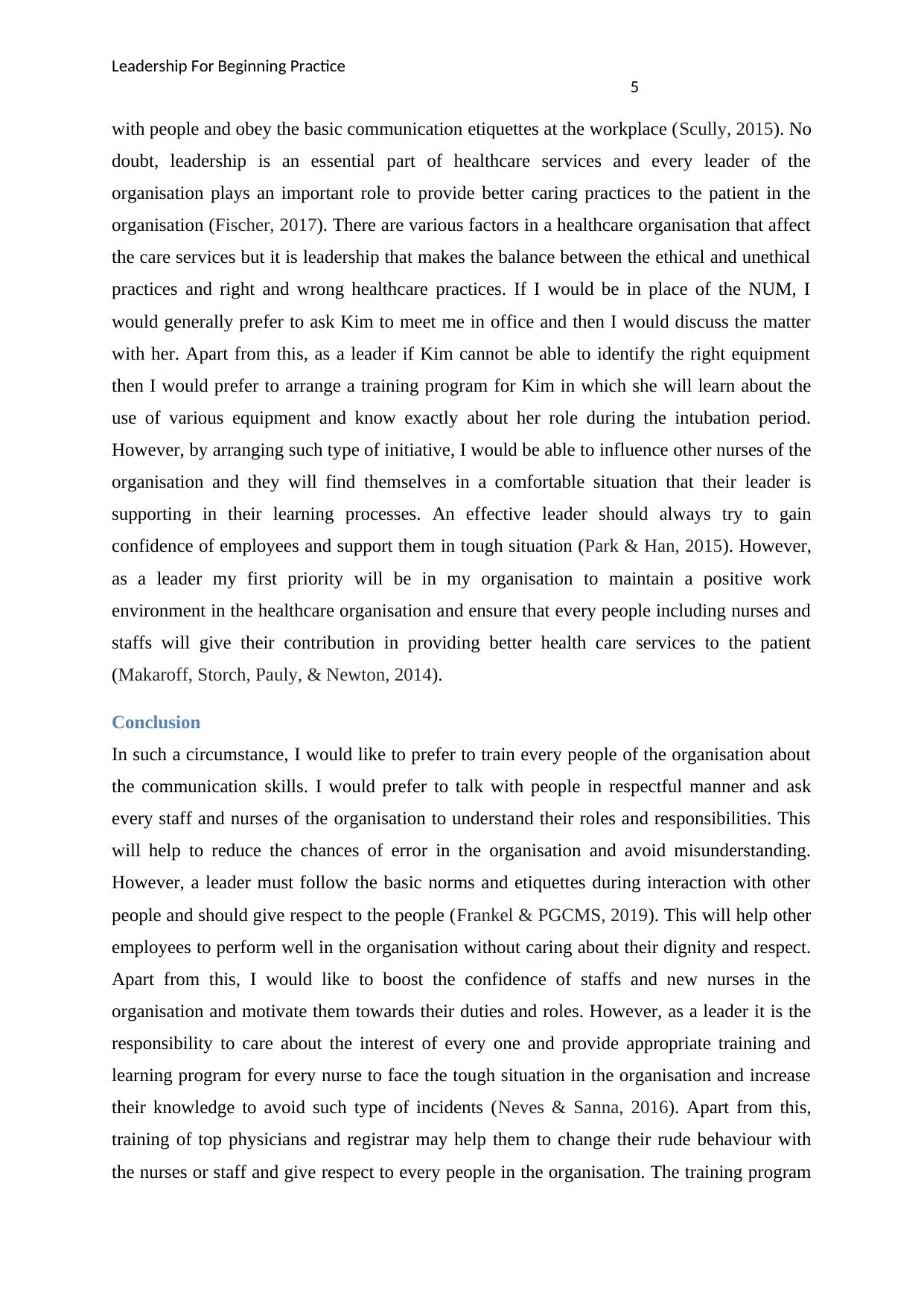
Leadership For Beginning Practice
5
with people and obey the basic communication etiquettes at the workplace (Scully, 2015). No
doubt, leadership is an essential part of healthcare services and every leader of the
organisation plays an important role to provide better caring practices to the patient in the
organisation (Fischer, 2017). There are various factors in a healthcare organisation that affect
the care services but it is leadership that makes the balance between the ethical and unethical
practices and right and wrong healthcare practices. If I would be in place of the NUM, I
would generally prefer to ask Kim to meet me in office and then I would discuss the matter
with her. Apart from this, as a leader if Kim cannot be able to identify the right equipment
then I would prefer to arrange a training program for Kim in which she will learn about the
use of various equipment and know exactly about her role during the intubation period.
However, by arranging such type of initiative, I would be able to influence other nurses of the
organisation and they will find themselves in a comfortable situation that their leader is
supporting in their learning processes. An effective leader should always try to gain
confidence of employees and support them in tough situation (Park & Han, 2015). However,
as a leader my first priority will be in my organisation to maintain a positive work
environment in the healthcare organisation and ensure that every people including nurses and
staffs will give their contribution in providing better health care services to the patient
(Makaroff, Storch, Pauly, & Newton, 2014).
Conclusion
In such a circumstance, I would like to prefer to train every people of the organisation about
the communication skills. I would prefer to talk with people in respectful manner and ask
every staff and nurses of the organisation to understand their roles and responsibilities. This
will help to reduce the chances of error in the organisation and avoid misunderstanding.
However, a leader must follow the basic norms and etiquettes during interaction with other
people and should give respect to the people (Frankel & PGCMS, 2019). This will help other
employees to perform well in the organisation without caring about their dignity and respect.
Apart from this, I would like to boost the confidence of staffs and new nurses in the
organisation and motivate them towards their duties and roles. However, as a leader it is the
responsibility to care about the interest of every one and provide appropriate training and
learning program for every nurse to face the tough situation in the organisation and increase
their knowledge to avoid such type of incidents (Neves & Sanna, 2016). Apart from this,
training of top physicians and registrar may help them to change their rude behaviour with
the nurses or staff and give respect to every people in the organisation. The training program
5
with people and obey the basic communication etiquettes at the workplace (Scully, 2015). No
doubt, leadership is an essential part of healthcare services and every leader of the
organisation plays an important role to provide better caring practices to the patient in the
organisation (Fischer, 2017). There are various factors in a healthcare organisation that affect
the care services but it is leadership that makes the balance between the ethical and unethical
practices and right and wrong healthcare practices. If I would be in place of the NUM, I
would generally prefer to ask Kim to meet me in office and then I would discuss the matter
with her. Apart from this, as a leader if Kim cannot be able to identify the right equipment
then I would prefer to arrange a training program for Kim in which she will learn about the
use of various equipment and know exactly about her role during the intubation period.
However, by arranging such type of initiative, I would be able to influence other nurses of the
organisation and they will find themselves in a comfortable situation that their leader is
supporting in their learning processes. An effective leader should always try to gain
confidence of employees and support them in tough situation (Park & Han, 2015). However,
as a leader my first priority will be in my organisation to maintain a positive work
environment in the healthcare organisation and ensure that every people including nurses and
staffs will give their contribution in providing better health care services to the patient
(Makaroff, Storch, Pauly, & Newton, 2014).
Conclusion
In such a circumstance, I would like to prefer to train every people of the organisation about
the communication skills. I would prefer to talk with people in respectful manner and ask
every staff and nurses of the organisation to understand their roles and responsibilities. This
will help to reduce the chances of error in the organisation and avoid misunderstanding.
However, a leader must follow the basic norms and etiquettes during interaction with other
people and should give respect to the people (Frankel & PGCMS, 2019). This will help other
employees to perform well in the organisation without caring about their dignity and respect.
Apart from this, I would like to boost the confidence of staffs and new nurses in the
organisation and motivate them towards their duties and roles. However, as a leader it is the
responsibility to care about the interest of every one and provide appropriate training and
learning program for every nurse to face the tough situation in the organisation and increase
their knowledge to avoid such type of incidents (Neves & Sanna, 2016). Apart from this,
training of top physicians and registrar may help them to change their rude behaviour with
the nurses or staff and give respect to every people in the organisation. The training program
⊘ This is a preview!⊘
Do you want full access?
Subscribe today to unlock all pages.

Trusted by 1+ million students worldwide
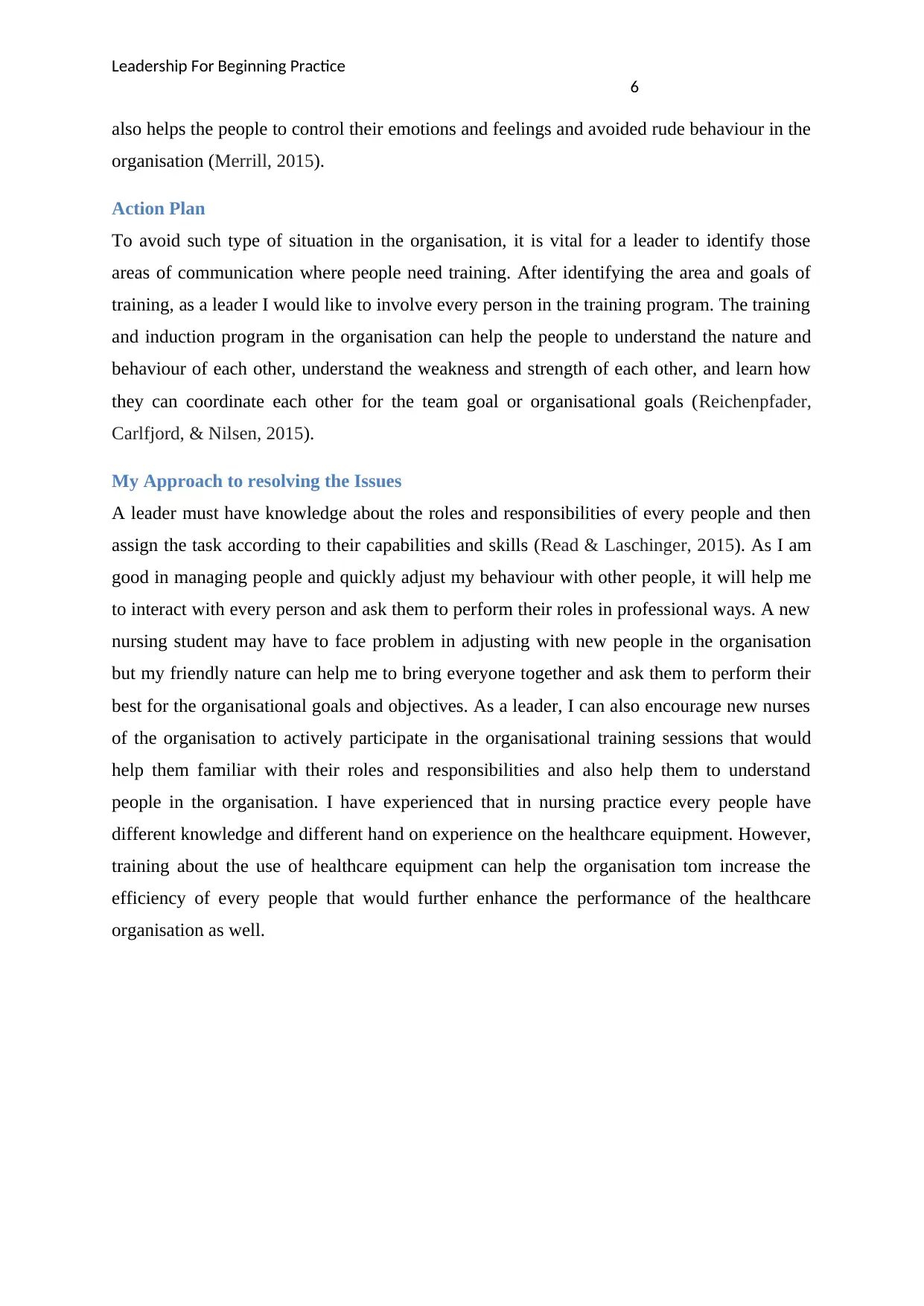
Leadership For Beginning Practice
6
also helps the people to control their emotions and feelings and avoided rude behaviour in the
organisation (Merrill, 2015).
Action Plan
To avoid such type of situation in the organisation, it is vital for a leader to identify those
areas of communication where people need training. After identifying the area and goals of
training, as a leader I would like to involve every person in the training program. The training
and induction program in the organisation can help the people to understand the nature and
behaviour of each other, understand the weakness and strength of each other, and learn how
they can coordinate each other for the team goal or organisational goals (Reichenpfader,
Carlfjord, & Nilsen, 2015).
My Approach to resolving the Issues
A leader must have knowledge about the roles and responsibilities of every people and then
assign the task according to their capabilities and skills (Read & Laschinger, 2015). As I am
good in managing people and quickly adjust my behaviour with other people, it will help me
to interact with every person and ask them to perform their roles in professional ways. A new
nursing student may have to face problem in adjusting with new people in the organisation
but my friendly nature can help me to bring everyone together and ask them to perform their
best for the organisational goals and objectives. As a leader, I can also encourage new nurses
of the organisation to actively participate in the organisational training sessions that would
help them familiar with their roles and responsibilities and also help them to understand
people in the organisation. I have experienced that in nursing practice every people have
different knowledge and different hand on experience on the healthcare equipment. However,
training about the use of healthcare equipment can help the organisation tom increase the
efficiency of every people that would further enhance the performance of the healthcare
organisation as well.
6
also helps the people to control their emotions and feelings and avoided rude behaviour in the
organisation (Merrill, 2015).
Action Plan
To avoid such type of situation in the organisation, it is vital for a leader to identify those
areas of communication where people need training. After identifying the area and goals of
training, as a leader I would like to involve every person in the training program. The training
and induction program in the organisation can help the people to understand the nature and
behaviour of each other, understand the weakness and strength of each other, and learn how
they can coordinate each other for the team goal or organisational goals (Reichenpfader,
Carlfjord, & Nilsen, 2015).
My Approach to resolving the Issues
A leader must have knowledge about the roles and responsibilities of every people and then
assign the task according to their capabilities and skills (Read & Laschinger, 2015). As I am
good in managing people and quickly adjust my behaviour with other people, it will help me
to interact with every person and ask them to perform their roles in professional ways. A new
nursing student may have to face problem in adjusting with new people in the organisation
but my friendly nature can help me to bring everyone together and ask them to perform their
best for the organisational goals and objectives. As a leader, I can also encourage new nurses
of the organisation to actively participate in the organisational training sessions that would
help them familiar with their roles and responsibilities and also help them to understand
people in the organisation. I have experienced that in nursing practice every people have
different knowledge and different hand on experience on the healthcare equipment. However,
training about the use of healthcare equipment can help the organisation tom increase the
efficiency of every people that would further enhance the performance of the healthcare
organisation as well.
Paraphrase This Document
Need a fresh take? Get an instant paraphrase of this document with our AI Paraphraser
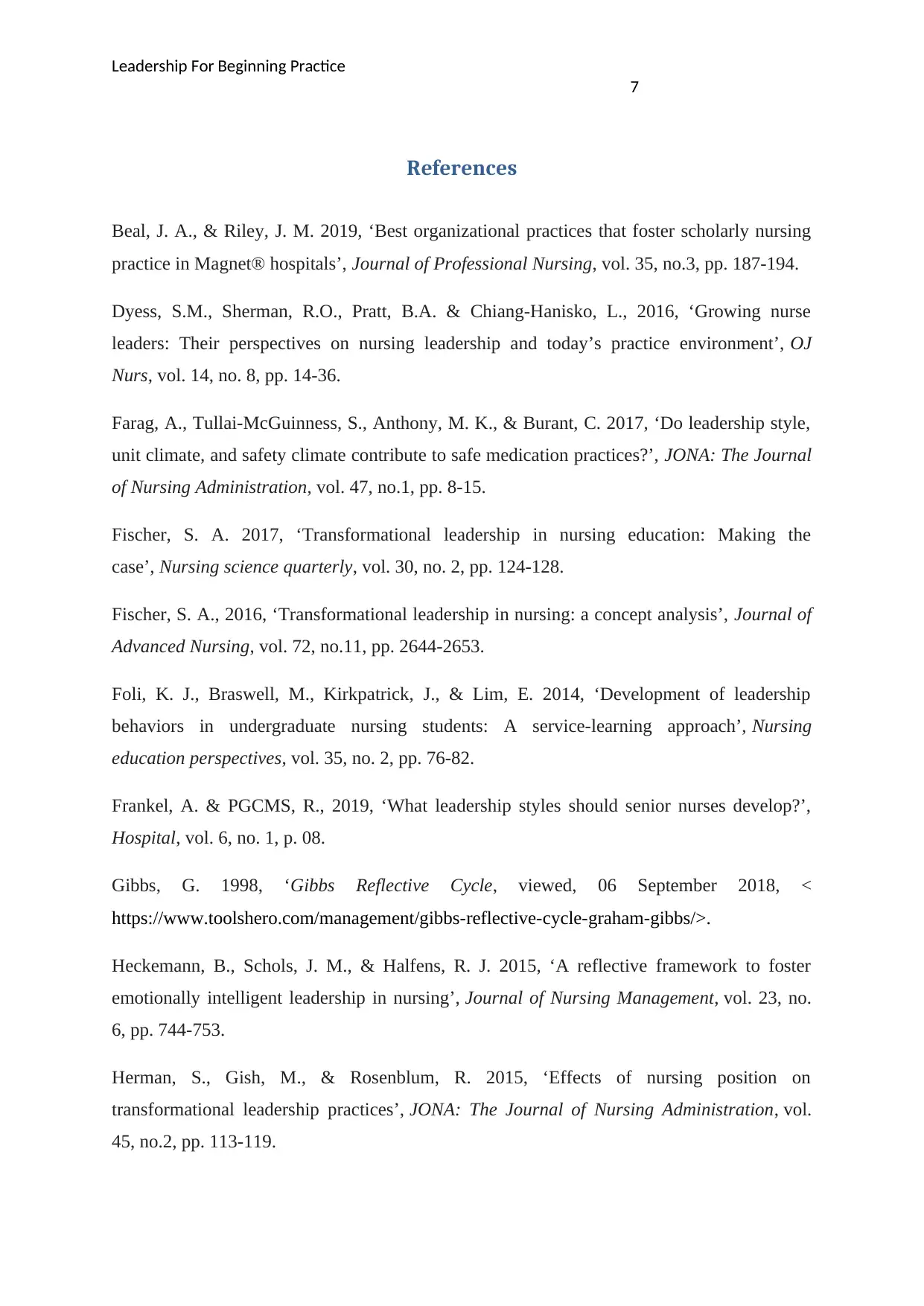
Leadership For Beginning Practice
7
References
Beal, J. A., & Riley, J. M. 2019, ‘Best organizational practices that foster scholarly nursing
practice in Magnet® hospitals’, Journal of Professional Nursing, vol. 35, no.3, pp. 187-194.
Dyess, S.M., Sherman, R.O., Pratt, B.A. & Chiang-Hanisko, L., 2016, ‘Growing nurse
leaders: Their perspectives on nursing leadership and today’s practice environment’, OJ
Nurs, vol. 14, no. 8, pp. 14-36.
Farag, A., Tullai-McGuinness, S., Anthony, M. K., & Burant, C. 2017, ‘Do leadership style,
unit climate, and safety climate contribute to safe medication practices?’, JONA: The Journal
of Nursing Administration, vol. 47, no.1, pp. 8-15.
Fischer, S. A. 2017, ‘Transformational leadership in nursing education: Making the
case’, Nursing science quarterly, vol. 30, no. 2, pp. 124-128.
Fischer, S. A., 2016, ‘Transformational leadership in nursing: a concept analysis’, Journal of
Advanced Nursing, vol. 72, no.11, pp. 2644-2653.
Foli, K. J., Braswell, M., Kirkpatrick, J., & Lim, E. 2014, ‘Development of leadership
behaviors in undergraduate nursing students: A service-learning approach’, Nursing
education perspectives, vol. 35, no. 2, pp. 76-82.
Frankel, A. & PGCMS, R., 2019, ‘What leadership styles should senior nurses develop?’,
Hospital, vol. 6, no. 1, p. 08.
Gibbs, G. 1998, ‘Gibbs Reflective Cycle, viewed, 06 September 2018, <
https://www.toolshero.com/management/gibbs-reflective-cycle-graham-gibbs/>.
Heckemann, B., Schols, J. M., & Halfens, R. J. 2015, ‘A reflective framework to foster
emotionally intelligent leadership in nursing’, Journal of Nursing Management, vol. 23, no.
6, pp. 744-753.
Herman, S., Gish, M., & Rosenblum, R. 2015, ‘Effects of nursing position on
transformational leadership practices’, JONA: The Journal of Nursing Administration, vol.
45, no.2, pp. 113-119.
7
References
Beal, J. A., & Riley, J. M. 2019, ‘Best organizational practices that foster scholarly nursing
practice in Magnet® hospitals’, Journal of Professional Nursing, vol. 35, no.3, pp. 187-194.
Dyess, S.M., Sherman, R.O., Pratt, B.A. & Chiang-Hanisko, L., 2016, ‘Growing nurse
leaders: Their perspectives on nursing leadership and today’s practice environment’, OJ
Nurs, vol. 14, no. 8, pp. 14-36.
Farag, A., Tullai-McGuinness, S., Anthony, M. K., & Burant, C. 2017, ‘Do leadership style,
unit climate, and safety climate contribute to safe medication practices?’, JONA: The Journal
of Nursing Administration, vol. 47, no.1, pp. 8-15.
Fischer, S. A. 2017, ‘Transformational leadership in nursing education: Making the
case’, Nursing science quarterly, vol. 30, no. 2, pp. 124-128.
Fischer, S. A., 2016, ‘Transformational leadership in nursing: a concept analysis’, Journal of
Advanced Nursing, vol. 72, no.11, pp. 2644-2653.
Foli, K. J., Braswell, M., Kirkpatrick, J., & Lim, E. 2014, ‘Development of leadership
behaviors in undergraduate nursing students: A service-learning approach’, Nursing
education perspectives, vol. 35, no. 2, pp. 76-82.
Frankel, A. & PGCMS, R., 2019, ‘What leadership styles should senior nurses develop?’,
Hospital, vol. 6, no. 1, p. 08.
Gibbs, G. 1998, ‘Gibbs Reflective Cycle, viewed, 06 September 2018, <
https://www.toolshero.com/management/gibbs-reflective-cycle-graham-gibbs/>.
Heckemann, B., Schols, J. M., & Halfens, R. J. 2015, ‘A reflective framework to foster
emotionally intelligent leadership in nursing’, Journal of Nursing Management, vol. 23, no.
6, pp. 744-753.
Herman, S., Gish, M., & Rosenblum, R. 2015, ‘Effects of nursing position on
transformational leadership practices’, JONA: The Journal of Nursing Administration, vol.
45, no.2, pp. 113-119.
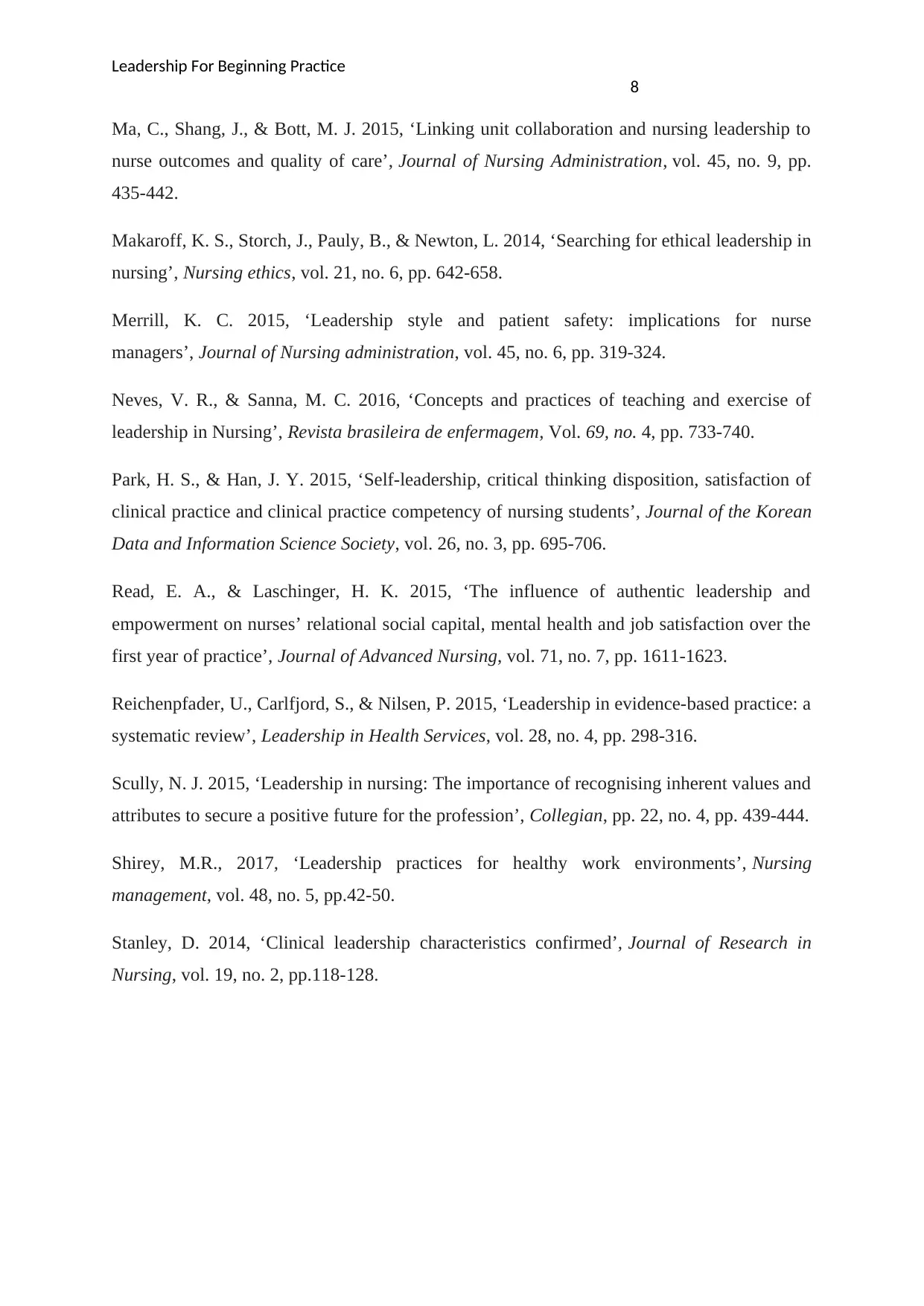
Leadership For Beginning Practice
8
Ma, C., Shang, J., & Bott, M. J. 2015, ‘Linking unit collaboration and nursing leadership to
nurse outcomes and quality of care’, Journal of Nursing Administration, vol. 45, no. 9, pp.
435-442.
Makaroff, K. S., Storch, J., Pauly, B., & Newton, L. 2014, ‘Searching for ethical leadership in
nursing’, Nursing ethics, vol. 21, no. 6, pp. 642-658.
Merrill, K. C. 2015, ‘Leadership style and patient safety: implications for nurse
managers’, Journal of Nursing administration, vol. 45, no. 6, pp. 319-324.
Neves, V. R., & Sanna, M. C. 2016, ‘Concepts and practices of teaching and exercise of
leadership in Nursing’, Revista brasileira de enfermagem, Vol. 69, no. 4, pp. 733-740.
Park, H. S., & Han, J. Y. 2015, ‘Self-leadership, critical thinking disposition, satisfaction of
clinical practice and clinical practice competency of nursing students’, Journal of the Korean
Data and Information Science Society, vol. 26, no. 3, pp. 695-706.
Read, E. A., & Laschinger, H. K. 2015, ‘The influence of authentic leadership and
empowerment on nurses’ relational social capital, mental health and job satisfaction over the
first year of practice’, Journal of Advanced Nursing, vol. 71, no. 7, pp. 1611-1623.
Reichenpfader, U., Carlfjord, S., & Nilsen, P. 2015, ‘Leadership in evidence-based practice: a
systematic review’, Leadership in Health Services, vol. 28, no. 4, pp. 298-316.
Scully, N. J. 2015, ‘Leadership in nursing: The importance of recognising inherent values and
attributes to secure a positive future for the profession’, Collegian, pp. 22, no. 4, pp. 439-444.
Shirey, M.R., 2017, ‘Leadership practices for healthy work environments’, Nursing
management, vol. 48, no. 5, pp.42-50.
Stanley, D. 2014, ‘Clinical leadership characteristics confirmed’, Journal of Research in
Nursing, vol. 19, no. 2, pp.118-128.
8
Ma, C., Shang, J., & Bott, M. J. 2015, ‘Linking unit collaboration and nursing leadership to
nurse outcomes and quality of care’, Journal of Nursing Administration, vol. 45, no. 9, pp.
435-442.
Makaroff, K. S., Storch, J., Pauly, B., & Newton, L. 2014, ‘Searching for ethical leadership in
nursing’, Nursing ethics, vol. 21, no. 6, pp. 642-658.
Merrill, K. C. 2015, ‘Leadership style and patient safety: implications for nurse
managers’, Journal of Nursing administration, vol. 45, no. 6, pp. 319-324.
Neves, V. R., & Sanna, M. C. 2016, ‘Concepts and practices of teaching and exercise of
leadership in Nursing’, Revista brasileira de enfermagem, Vol. 69, no. 4, pp. 733-740.
Park, H. S., & Han, J. Y. 2015, ‘Self-leadership, critical thinking disposition, satisfaction of
clinical practice and clinical practice competency of nursing students’, Journal of the Korean
Data and Information Science Society, vol. 26, no. 3, pp. 695-706.
Read, E. A., & Laschinger, H. K. 2015, ‘The influence of authentic leadership and
empowerment on nurses’ relational social capital, mental health and job satisfaction over the
first year of practice’, Journal of Advanced Nursing, vol. 71, no. 7, pp. 1611-1623.
Reichenpfader, U., Carlfjord, S., & Nilsen, P. 2015, ‘Leadership in evidence-based practice: a
systematic review’, Leadership in Health Services, vol. 28, no. 4, pp. 298-316.
Scully, N. J. 2015, ‘Leadership in nursing: The importance of recognising inherent values and
attributes to secure a positive future for the profession’, Collegian, pp. 22, no. 4, pp. 439-444.
Shirey, M.R., 2017, ‘Leadership practices for healthy work environments’, Nursing
management, vol. 48, no. 5, pp.42-50.
Stanley, D. 2014, ‘Clinical leadership characteristics confirmed’, Journal of Research in
Nursing, vol. 19, no. 2, pp.118-128.
⊘ This is a preview!⊘
Do you want full access?
Subscribe today to unlock all pages.

Trusted by 1+ million students worldwide
1 out of 9
Related Documents
Your All-in-One AI-Powered Toolkit for Academic Success.
+13062052269
info@desklib.com
Available 24*7 on WhatsApp / Email
![[object Object]](/_next/static/media/star-bottom.7253800d.svg)
Unlock your academic potential
Copyright © 2020–2026 A2Z Services. All Rights Reserved. Developed and managed by ZUCOL.





